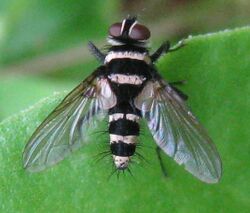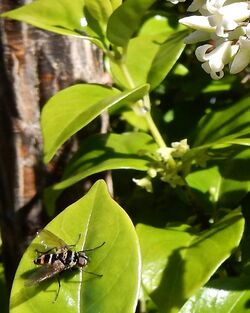Biology:Trigonospila brevifacies
| Trigonospila brevifacies | |
|---|---|

| |
| Scientific classification | |
| Domain: | Eukaryota |
| Kingdom: | Animalia |
| Phylum: | Arthropoda |
| Class: | Insecta |
| Order: | Diptera |
| Family: | Tachinidae |
| Subfamily: | Exoristinae |
| Tribe: | Blondeliini |
| Genus: | Trigonospila |
| Species: | T. brevifacies
|
| Binomial name | |
| Trigonospila brevifacies (Hardy, 1934)[1]
| |
| Synonyms | |
| |
Trigonospila brevifacies is a species of true fly in the family Tachinidae native to eastern Australia .[2] This species is also found in New Zealand. Like the vast majority of tachinid flies, T. brevifacies is a parasitoid of other insects, specifically late larval stages of a number of species of Lepidoptera. It is also known as the Australian Leaf-Roller Fly or Leafroller Fly.
Distribution
Trigonospila brevifacies is native to the eastern states of Australia and has been collected from Tasmania, New South Wales, Victoria, and southern Queensland. T. brevifacies is also present in New Zealand as it was introduced to control a number of agricultural pests.[3][4]
Identification
Like all Trigonospila species, T. brevifacies can be recognised by its distinctive markings. They are primarily black with pearly whitish to golden transverse bars on the thorax and abdomen.
Trigonospila brevifacies is frequently confused with T. cingulata in locations where both species co-occur. T. cingulata appears to much more common than T. brevifacies, particularly in Queensland, New South Wales, and the Australian Capital Territory. It is believed T. cingulata is a parasitoid of chrysomelid beetle larvae in the genus Paropsis, which are abundant herbivores in many Australian environments.[2] Only T. brevifacies is known to be present in New Zealand.
Trigonospila brevifacies can be easily distinguished from T. cingulata by colouration of the abdomen. The black and white abdominal markings of T. cingulata are continuous, crisp stripes from the dorsal to ventral sides of the abdomen, whereas the black markings of T. brevifacies typically are more or less triangular spots on the anterior margin of each the third, fourth, and fifth abdominal tergites which may or may not be quite diffused.[1] The sides of the abdomen in both sexes of T. brevifacies are yellow.
Biocontrol

Trigonospila brevifacies is an economically important parasitoid of a number of larvae of Lepidoptera and has been deployed in New Zealand as a biocontrol agent of a number of pest species including the light brown apple moth Epiphyas postvittana (Lepidoptera : Tortricidae) and the potato tuber moth Phthorimaea operculella (Lepidoptera : Gelechiidae). T. brevifacies was initially introduced to New Zealand to control the light brown apple moth Epiphyas postvittana and released a number of times between 1967 and 1973 to control a number of other pests. However it competes with many native parasitoids, because it is polyphagous on Lepidoptera.[5] Of the 18 confirmed and published hosts (below), at least 10 are known pests in agriculture or forestry.
Host range
Trigonospila brevifacies is the only species of Trigonospila for which substantial host records exist. The species is polyphagous and known to parasitise at least 18 species of Lepidoptera in 8 families. Some of these are non target species and T. brevifacies is found to compete with many native parasitods [6]
Carposinidae
- Carpinosina adreptella (Walker) [7]
Gelechiidae
- Helcystogramma sp. [4]
- Phthorimaea operculella Zeller[2]
Geometridae
- Pasiphila lunata (Philpott)[3]
Tortricidae
- Cnephasia jactatana (Walker)[7]
- Ctenopseustis obliquana (Walker)[7]
- Epalxiphora axanana (Meyrick)[3]
- Epiphyas postvittana (Walker)[2]
- Planotortrix excessana (Walker)[7]
- Planotortrix notophaea (Walker)[7]
- Pyrgotis lagiatana (Walker)[7]
- Strepsicrates macropetana (Meyrick)[8]
Oecophoricae
- Eutorna phalocosma (Meyrick)[9]
- Hierodoris atychioides (Butler)[10]
Pterophoridae
Pyralidae
- Epipaschia costigeralis (Walker)[11]
Stathmopodidae
- Stathmopoda skelloni (Butler)[10]
References
- ↑ 1.0 1.1 Hardy, G.M. (1934). "Notes on Australian Muscoidea (Calyptrata)". Proceedings of the Royal Society of Queensland (The Royal Society of Queensland) 45: 30–37..
- ↑ 2.0 2.1 2.2 2.3 Crosskey, R.W. (1973). "A conspectus of the Tachinidae (Diptera) of Australia, including keys to the supraspecific taxa and taxonomic and host catalogues". Bulletin of the British Museum (Natural History), Entomology Series (London: British Museum (Natural History)) Supplement 21: 1–221.
- ↑ 3.0 3.1 3.2 Green OR (1984) New Zealand host and locality records for an introduced tortricid parasite, Trigonospila brevifacies (Diptera: Tachinidae). New Zealand Entomologist 8: 69-71.
- ↑ 4.0 4.1 Shaw PW, Lo P, and Wall DR (2001) Recent introduction and establishment of the leafroller parasitoid Trigonospila brevifacies (Hardy) (Diptera: Tachinidae) in Nelson. New Zealand Plant Protection 54: 33-36.
- ↑ "Trigonospila" (in en). http://www.landcareresearch.co.nz/science/plants-animals-fungi/animals/invertebrates/systematics/tachinidae/factsheets/trigonospila.
- ↑ Munroe VMW, and Henderson IM (2002) Nontarget Effect of Entomophagous Biocontrol: Shared Parasitism Between Native Lepidopteran Parasitoids and the Biocontrol Agent Trigonospila brevifacies (Diptera: Tachinidae) in Forest Habitats. Environmental Entomology 31(2): 388-396.
- ↑ 7.0 7.1 7.2 7.3 7.4 7.5 Wearing C H, WP Thomas, JS Dugdale, & W Danthanarayana (1991) Tortricid pests of pome and stone fruits, Australian and New Zealand species. L.P.S. van der Geest H. H Evenhuis Tortricid pests, their biology, natural enemies and control. 453-472. Elsevier Amsterdam, the Netherlands.
- ↑ Withers TM (2001) Colonization of eucalypts in New Zealand by Australian insects. Austral Ecology 26: 467-476.
- ↑ Munro MW (1997) Eutorna phaulocosma Meyrick (Lepidoptera: Oecophoridae), a new host for the introduced Australian parasitoid Trigonospila brevifacies Hardy (Diptera: Tachinidae). New Zealand Entomologist 20: 71-72.
- ↑ 10.0 10.1 10.2 10.3 Berry JA (1990) Two parasitoid complexes: Heirodoris atychioides (Butler) (Lepidoptera: Oecophoridae) and Icerya purchasi Maskell (Homoptera: Margarodidae). New Zealand Entomologist 13: 60-62.
- ↑ Cantrell BK (1986) An updated hots catalogue for the Australian Tachinidae (Diptera). Journal of the Australian Entomological Society 25: 255-265.
Wikidata ☰ Q15633413 entry
 |

